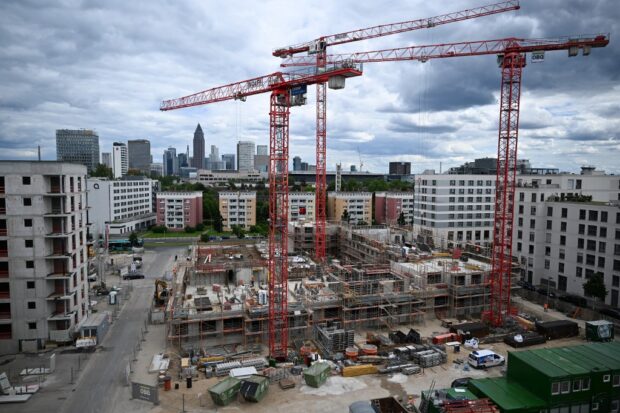
Cranes stand on a construction site for housing appartments in Frankfurt am Main, western Germany, on May 28, 2024. In the west Frankfurt suburbs on a plot wedged between a motorway and a wooded park, excavators are preparing the ground for 400 new apartments. Frankfurt’s municipal housing group ABG Holding and its financial partner LBBW Immobilien signed off on the project before things turned bad for the construction sector. (Photo by Kirill KUDRYAVTSEV / AFP)
Frankfurt, Germany — Germany’s inflation rate slowed more than expected in June, official data showed Monday, in welcome news for the European Central Bank following last month’s first interest rate cut since 2019.
Inflation in Europe’s biggest economy edged back down to 2.2 percent from a year ago, preliminary data from federal statistics agency Destatis showed.
The decline comes after one-off factors saw consumer prices rise by 2.4 percent in May, the first increase in six months.
READ: Global stocks rally, euro climbs, tracking French election
Analysts surveyed by FactSet had expected the inflation figure to stay unchanged in June.
“The ups and downs continue — yet the overall trend is moving in the right direction,” said KfW chief economist Fritzi Koehler-Geib.
German energy prices fell by 2.1 percent year-on-year in June, compared with a decline of 1.1 percent in May.
Food inflation accelerated by 1.1 percent in June, while prices for services rose by 3.9 percent, unchanged from May.
Germany’s June data will likely be cheered by European Central Bank policymakers, after they began reducing interest rates last month in the face of steadily falling eurozone inflation.
The rate cut lowered the ECB’s closely-watched deposit rate from a record four percent to 3.75 percent.
But ECB chief Christine Lagarde warned that there was still a “long way to go until inflation is squeezed out of the economy”.
Lagarde and other ECB officials have since been at pains to temper expectations of another reduction in borrowing costs at their July meeting, saying there was no “pre-determined” rate path.
Eurozone inflation rose faster than expected in May, to 2.6 percent.
The eurozone’s June inflation reading will be published on Tuesday.